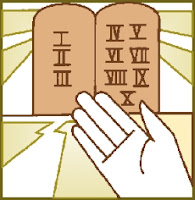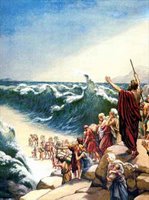The Law, Moses, and Jeremiah
 Q: I’m having trouble understanding two particular verses of the Bible. First, the Lord commanded Jeremiah to say this to Judah: “How can you say, ‘We [Jews] are wise, for we have the law of the Lord,’ when actually the lying pen of the scribes has handled it falsely? (NIV Bible, Jeremiah 8:8)” Is Jeremiah saying that someone corrupted the Ten Commandments? But the Commandments don’t seem to be corrupted in any way. If they were, wouldn’t it show in the Bible? Especially, what did Jeremiah mean, especially by “the lying pen of the scribes”?
Q: I’m having trouble understanding two particular verses of the Bible. First, the Lord commanded Jeremiah to say this to Judah: “How can you say, ‘We [Jews] are wise, for we have the law of the Lord,’ when actually the lying pen of the scribes has handled it falsely? (NIV Bible, Jeremiah 8:8)” Is Jeremiah saying that someone corrupted the Ten Commandments? But the Commandments don’t seem to be corrupted in any way. If they were, wouldn’t it show in the Bible? Especially, what did Jeremiah mean, especially by “the lying pen of the scribes”?Also Moses said something about the 10 Commandments: “He gave this command to the Levites who carried the ark of the covenant of the Lord: ‘Take this Book of the Law and place it beside the ark of the covenant of the Lord your God. There it will remain as a witness against you. For I know how rebellious and stiff-necked you are. If you have been rebellious against the Lord while I am still alive and with you, how much more will you rebel after I die! Assemble before me all the elders of your tribes and all your officials, so that I can speak these words in their hearing and call heaven and earth to testify against them. For I know that after my death you are sure to become utterly corrupt and to turn from the way I have commanded you. In days to come, disaster will fall upon you because you will do evil in the sight of the Lord and provoke him to anger by what your hands have made. (Deuteronomy 31:25-29 NIV)”
I am new to Christianity and am confused about these verses. Could you explain these to me? Is there any historical background to these verses?
A: Let’s deal with Deuteronomy first. In this section, Moses wasn’t just talking about the Ten Commandments but about all of God’s Word that had been revealed to him and recorded by him. Most Bible scholars assume that he was speaking of the entire book we call Deuteronomy — which means “second law.” Evidently, he or his assistants had already completed recording the first four books of Genesis through Numbers and now he was compiling the final commands from the Lord with his own last few sermons.
 In Deuteronomy, “law” is the word usually used to translate the Hebrew “Torah,” which means much more than simple commands. Torah — still the name by which most Jews know the five Books of Moses — also includes the ideas of instruction or teaching as well as other utterances of the Lord. Many of these words of God in the Torah are not commands but rather words of promises, redemption, forgiveness, and salvation. Some of this rescue was from earthly woes (such as Passover and the Exodus) and some from spiritual bondage (beginning with the first promise of a Savior in Genesis 3:15).”
In Deuteronomy, “law” is the word usually used to translate the Hebrew “Torah,” which means much more than simple commands. Torah — still the name by which most Jews know the five Books of Moses — also includes the ideas of instruction or teaching as well as other utterances of the Lord. Many of these words of God in the Torah are not commands but rather words of promises, redemption, forgiveness, and salvation. Some of this rescue was from earthly woes (such as Passover and the Exodus) and some from spiritual bondage (beginning with the first promise of a Savior in Genesis 3:15).”Anyhow, Moses was commanding Israel both to follow the commands and to trust in the promises of the Lord which God had revealed through him. After forty years of leading this “rebellious and stubborn (Deuteronomy 31:27)” people, Moses knew all too well how quickly they could forget what God had already done for them, ignore His commands, and neglect His promises. Therefore, Moses foretold Israel’s continuing struggle with faithfulness to God’s Word: “I know that after my death you will surely act corruptly and turn aside from the way that I have commanded you. And in the days to come evil will befall you, because you will do what is evil in the sight of the Lord, provoking him to anger through the work of your hands. (31:29)”
We see the ongoing example of corrupt actions already under Joshua. There, trouble came upon Israel (see 7:1-5) when Achan kept for himself “some of the devoted things (7:11)” of Jericho — items that God had commanded to either be destroyed or else added “to the treasury of the Lord. (6:19)”
The book of Judges records a systemic pattern of not doing the Lord’s will. In the first chapter, we read how the various tribes “did not drive out the inhabitants (vv. 27-36)” of the regions where the Lord had so commanded. As the tribes settled into their inheritances and the people established homes, the Israelites regularly began doing, “what was evil in the sight of the Lord. (2:11; 3:7; 3:12; 4:1; 6:1; 10:6, and 13:1)” The Lord responded by regularly allowing surrounding nations to oppress Israel for a time, until He sent a deliverer in the person of one of the judges.
After the time of the Judges, when Israel was ruled by the kings, nothing changed. Samuel asked Saul, “Why did you ... do what was evil in the sight of the Lord? 1 Samuel 15:19)” In 1 Kings 11:6, “Solomon did what was evil in the sight of the Lord.” Not much later, the kingdom split and the entire southern kingdom of Judah, under Solomon’s son Rehoboam, heard the same accusation, that they had done “what was evil in the sight of the Lord. (14:22)” Throughout 1 and 2 Kings and 1 and 2 Chronicles, this particular phrase appears numerous times.
 Its final appearance came while Jeremiah was prophesying in the name of the Lord. During the rule of Zedekiah, after Babylon had already attacked and Judah agreed to peace terms, the king “did what was evil in the sight of the Lord (Jeremiah 52:2)” and compounded his sin by rebelling “against the king of Babylon. (v. 3)” This led Babylon to almost completely destroy Jerusalem in retaliation. Additionally, “The king of Babylon slaughtered the sons of Zedekiah before his eyes, and also slaughtered all the officials of Judah at Riblah. He put out the eyes of Zedekiah, and bound him in chains, and the king of Babylon took him to Babylon, and put him in prison till the day of his death. (vv. 10-11)”
Its final appearance came while Jeremiah was prophesying in the name of the Lord. During the rule of Zedekiah, after Babylon had already attacked and Judah agreed to peace terms, the king “did what was evil in the sight of the Lord (Jeremiah 52:2)” and compounded his sin by rebelling “against the king of Babylon. (v. 3)” This led Babylon to almost completely destroy Jerusalem in retaliation. Additionally, “The king of Babylon slaughtered the sons of Zedekiah before his eyes, and also slaughtered all the officials of Judah at Riblah. He put out the eyes of Zedekiah, and bound him in chains, and the king of Babylon took him to Babylon, and put him in prison till the day of his death. (vv. 10-11)”Getting back to your first concern, many of the Hebrews’ ongoing problems came because they regularly neglected “the law of the Lord. (Jeremiah 8:8)” Not only the Ten Commandments — they defiled the entire Torah, encompassing all of the commands and promises of the Lord. The scribes whom Jeremiah condemned were supposed to diligently copy and faithfully teach everything from the Books of Moses. However, they began replacing God’s Word with their own thoughts and opinions. This false teaching led all of Judah to think, “we are wise.” However, Jeremiah clearly condemned the regular transmission of false doctrine by “the lying pen of the scribes.”
This pattern continued into New Testament times. Jesus often faced hostile Scribes and Pharisees who misinterpreted and mis-taught God’s holy Word. Saint Paul also condemned “a Jew” who taught the Law but lived a contrary life (see Romans 2:17-24).
Scripture, except as noted, quoted from The Holy Bible, English Standard Version™, © 2001 by Crossway Bibles.
Send email to Ask the Pastor.
Walter Snyder is the pastor of Holy Cross Lutheran Church, Emma, Missouri and coauthor of the book What Do Lutherans Believe.
Technorati Tags: Bible | Law | Torah | 10 Commandments | Ten Commandments | Old Testament | Books of Moses | Deuteronomy | Jeremiah | punishment | condemnation | theology | exegetical theology | exegesis | Bible | Holy Scripture | Word of God | God’ Word | Law and Gospel | Lutheran | confessional Lutheran | Lutheranism | Christian | Christianity | Ask the Pastor
Newspaper column #521

0 Comments:
Post a Comment
<< Home